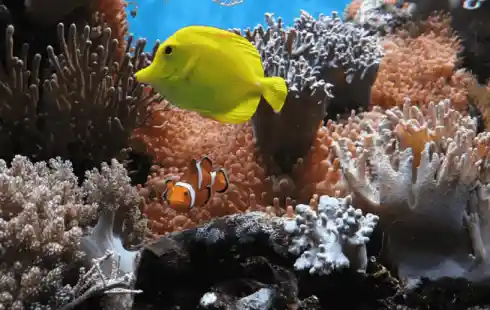
Ukrainian Diplomat Calls for Stronger Security Commitments Beyond NATO-Style Guarantees
Section: Politics
 Coral reefs, vibrant ecosystems of immense biodiversity, are currently in a critical state of decline. This crisis not only threatens marine life but also jeopardizes the livelihoods of coastal communities and the global ecosystem. As we confront these challenges, it is crucial to embrace innovative solutions and advancements in conservation efforts to ensure the survival of these invaluable marine ecosystems.
Coral reefs, vibrant ecosystems of immense biodiversity, are currently in a critical state of decline. This crisis not only threatens marine life but also jeopardizes the livelihoods of coastal communities and the global ecosystem. As we confront these challenges, it is crucial to embrace innovative solutions and advancements in conservation efforts to ensure the survival of these invaluable marine ecosystems.
Coral reefs, covering less than 1% of the ocean floor, support a quarter of all marine species. Yet, they face unprecedented threats exacerbated by human activities. Climate change-driven coral bleaching, caused by rising sea temperatures and ocean acidification, poses a significant risk. Additionally, pollution from runoff and destructive fishing practices further stress these delicate ecosystems.
In response to these challenges, there is a growing movement towards innovative conservation efforts:
Advanced Coral Restoration Techniques: Scientists and conservationists are pioneering new methods to restore damaged reefs. Techniques such as coral gardening, where corals are grown in nurseries and transplanted onto degraded reefs, show promising results in enhancing reef resilience.
Technology and Monitoring: Cutting-edge technologies like remote sensing, drones, and underwater robots are revolutionizing coral reef monitoring. These tools provide real-time data on coral health, allowing for targeted conservation interventions.
Community Engagement and Sustainable Practices: Local communities are being empowered as stewards of coral reefs through education and training programs. Sustainable fishing practices and responsible tourism initiatives are also gaining momentum, reducing pressure on fragile reef ecosystems.
Innovative Advances in the Movement
Recent advancements in coral reef conservation highlight a shift towards proactive and sustainable solutions:
3D Printing of Artificial Reefs: Researchers are exploring the use of 3D printing technology to create artificial reefs that mimic natural coral structures. This approach not only provides habitat for marine life but also promotes reef recovery in degraded areas. Places like the Great Barrier Reef in Australia and the Mesoamerican Barrier Reef System in the Caribbean could benefit greatly from these efforts.
Bioengineering Resilient Corals: Scientists are investigating genetic and microbiological approaches to enhance coral resilience to climate stressors. By identifying and breeding resilient coral species or modifying their symbiotic relationships, researchers aim to create reefs that are more resistant to bleaching and disease.
International Collaboration and Policy Initiatives: Governments, NGOs, and international organizations are increasingly working together to establish marine protected areas and enforce regulations that safeguard coral reefs. The United Nations Decade of Ocean Science for Sustainable Development (2021-2030) represents a global commitment to advancing ocean research and conservation efforts.
As we navigate the challenges facing coral reefs, embracing innovation and collaboration is essential for their survival. By harnessing advanced technologies, fostering community engagement, and implementing sustainable practices, we can protect these vital ecosystems for future generations. The time to act is now, to ensure that coral reefs continue to thrive as vibrant hubs of marine biodiversity and resilience in iconic places like the Great Barrier Reef, the Mesoamerican Barrier Reef System, and other critical reef systems around the world. Together, we can make a difference in preserving the natural wonders that enrich our planet's biodiversity and sustain our global ecosystem.

Section: Politics

Section: News

Section: News

Section: News

Section: Arts

Section: News

Section: News

Section: News

Section: News

Section: News

Health Insurance in Germany is compulsory and sometimes complicated, not to mention expensive. As an expat, you are required to navigate this landscape within weeks of arriving, so check our FAQ on PKV. For our guide on resources and access to agents who can give you a competitive quote, try our PKV Cost comparison tool.

Germany is famous for its medical expertise and extensive number of hospitals and clinics. See this comprehensive directory of hospitals and clinics across the country, complete with links to their websites, addresses, contact info, and specializations/services.

Join us at the Kunstraum in der Au for the exhibition titled ,,Ereignis: Erzählung" by Christoph Scheuerecker, focusing on the captivating world of bees. This exhibition invites visitors to explore the intricate relationship between bees and their environment through various artistic expressions,...
No comments yet. Be the first to comment!